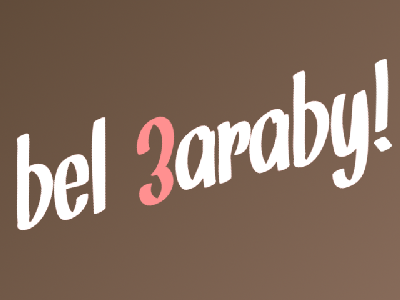Franco 3arabi
(Franco – Arabic)
 A new writing style spreads around the world especially the Arab world; it’s not Arabic or English. It’s a mixture between both of them. It has its own name depending on the language by which person transliterate Arabic, therefore it is known in Egypt Arabish or Arablish for English is the first foreign language here. The broader phenomenon is known as Franco Arab.
A new writing style spreads around the world especially the Arab world; it’s not Arabic or English. It’s a mixture between both of them. It has its own name depending on the language by which person transliterate Arabic, therefore it is known in Egypt Arabish or Arablish for English is the first foreign language here. The broader phenomenon is known as Franco Arab.
The roots of this phenomenon go back to 1990 when the western text communication technologies became increasingly prevalent in the Arab world such as personal computers, cellular phones, emails and world wide webs. At that time, Arabic alphabet wasn’t an optional feature and Latin alphabet was commonly used in all of these forms of communication. So, how could Arab users of this new western system communicate?
Written Arabic 28 letters which include sounds that are not used in English. Arabs had no choice but transliterating their Arabic into English using Latin letters. Not only letters those were used in this process but also numbers because
some Arabic letters don’t have an approximate phonetic equivalent in Latin script. So, they used numerals and other characters to express their Arabic letters, e.g. number “3” is used to stand for the Arabic letter “ع“ (Ayn) as they look a like.
Franco Arabic writing features:
(2)Stands for “hamza” in Arabic “ء” and this hamza have a sense of glottal stop.
(a /aa) Stands for “alif” in Arabic “أ“ and it is along vowel /a/.
(b) Stands for the Arabic letter “baa” (ب). /b/
(t) is used instead of the Arabic letter “taa” (ت ) /t/.
(th/s) can be used in the place of the Arabic letter (ث )
(g/j) are used instead of the arabic letter (ج ) /g/.
(7) Stands for the Arabic letter (ح) /h/.
(7’/5/kh) can be used instead of (خ) /x/.
(d) Stands for (د) /d/.
(th/z) are used instead of (ذ) /z/.
(r) Stands for (ر) /r/.
(s) Stands for (س) /s/.
(sh) Corresponds to (ش) /sh/ (sheen).
(S/9 .nine) Can be used instead of (ص) /s/hard (saad.).
(D/9′ .nine) Stand for (ض) /d/ hard (daad)
(t/6) stand for (ط) /t/ taa)
(Z/6′) stands for (ظ) /z/ hard (zaa).
(3) Stands for (ع) /Ayn/.
(3’/ gh) stands for (غ) /ghein/.
(f) Used in the place of (ف) /f/ (faa).
(q/8) stands for (ق) /q/ (qaaf).
(k) Stands for (ك) /k/ (kaaf).
(L) (ل) /L/ (laam).
(m) (م) /m/ (meem).
(n) (ن) /n/ (noon).
(h) (ه) /h/ (haa).
(O/u/oo/w/ou) (و) /w/ (waaw).
(Y/e/i/ee/ei/ie) (ى) /y/ (yaa).
This new writing style on the internet become so popular that it is used to express everyday speech and many abbreviations for this speech are invented by the its users such as some Arabic expressions:
S3_______ Salamo 3alikom : and this is the most common greeting in Egypt and Muslim world it means peace be upon you.
inA_______ in shaa Allah: this is a very common expression in Muslim & Arab countries and it means god’s willing hopefully wills.
.
msA_______ ma shaa’ Allah: it’s also very common in the Muslim world, meaning It’s because of god .
l7l …….. al hamdu lellah: Thanks be to Allah.
Other abbreviations are made up for the most commonly used English expressions in Arab world:
LoL______ laugh out loud
WB______ welcome back
Tom______ tomorrow
2 day______ today
plz________ please
thnx_______ thanks
B4________ before
Bbm______ black berry me
Fbm______ face book me
Btw______ by the way
Hru______ how are you
Hrt_______ how are things
C u tom____ see you tomorrow
(For more info & abbreviations, visit www. Internetslang.com)
Face book, Yahoo, Google and Twitter are the most places in which such strange language is common. It’s normal to find a complete conversation in Franco Arabic;
A: hi how r u?
B: tamam w enta 3amel eh ? (& you how are you doing?)
A: ana kowayyes l7l . (I’m fine thanks be to Allh)
B: eh a5bar sho3’lak? (what’s new about your worl?)
A: kullo tamam w enta. (everything is ok ,and you?)
B: l7l .. bos ana raye7 anam delw2ti ashofak bokra mashi . (Thanks be to Allah .. look! I’will go to sleep now .See you tomorrow .Ok )
A: mashi bye .( Ok . bye )
In spite of the large number of Franco Arabic users, some people see that it’s a dangerous phenomenon that threatens the existence of real Arabic & real English. They can distort both Arabic & English by passing time. Others find it a very easy way to communicate as it has no rules and it is interpretative because of its informal nature.
